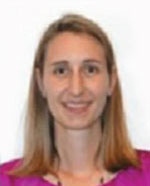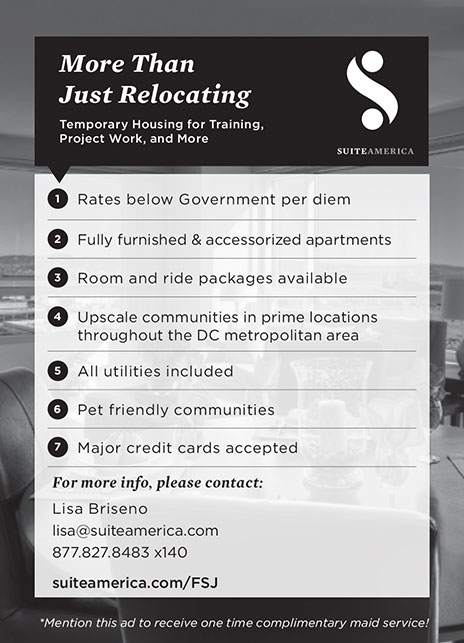Federal Women’s Program for the Future
Foreign Service women in Panama are rejuvenating the Federal Women’s Program as a platform for career development.
BY THAO ANH TRAN AND KRISTIN STEWART
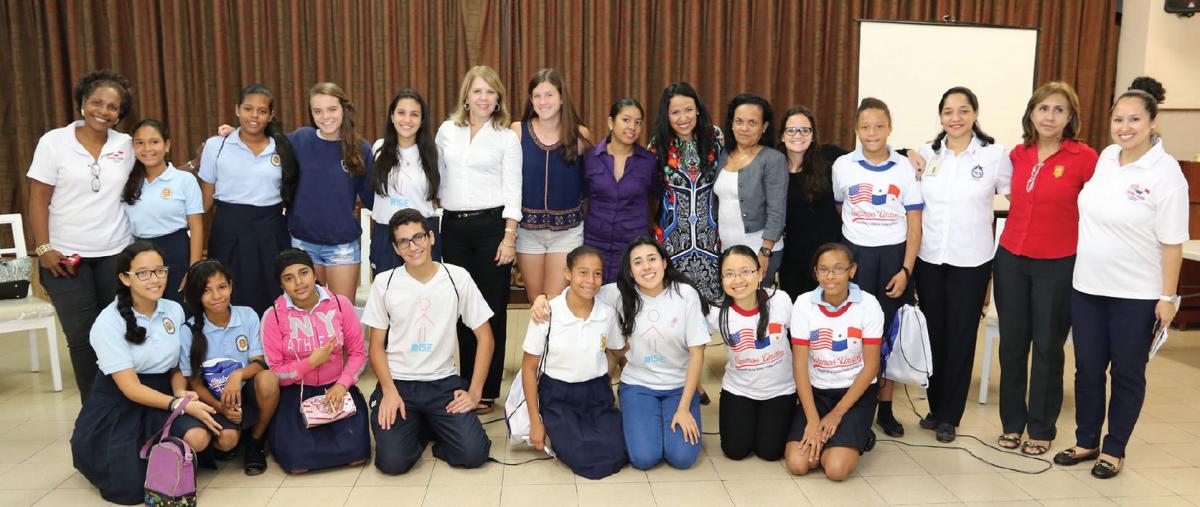
On International Day of the Girl last October, Thao Anh Tran (front, second from right) visited the Instituto Nuestra Señora de la Merced high school to highlight the importance of adolescent girls’ education and empowerment in shaping a stronger Panamanian society.
Courtesy of Public Affairs / U.S. Embassy in Panama
When the Federal Women’s Program coordinator vacancy was advertised this past fall in Panama, three women applied: a second-tour officer, an FS-2 and an FS-1. The management counselor, also a woman, consulted the applicants, and an innovative assignment resulted. The second-tour officer was appointed as the official FWP coordinator, with specific mentoring and support offered by more senior officers to bolster the program.
The result has been a robust interagency effort that may serve as a model for the kind of infrastructure needed to help support female members of the Foreign Service in pursuing successful careers.
Seizing the Opportunity
The FWP’s roots go back to 1961 when President John F. Kennedy created the Commission on the Status of Women to examine barriers facing women in the federal government and to enhance employment opportunities for women in every area of federal service. In 1967, President Lyndon Johnson established the FWP, based on the commission’s recommendation to make the status of women an integral part of the larger equal employment opportunity (EEO) effort. He also signed an executive order prohibiting discrimination on the basis of gender.
At the State Department, the FWP helps ensure that women receive equal opportunity in recruitment, selection, training and advancement in the Foreign and Civil Services. Posts with six or more female U.S. citizen employees are required to designate a coordinator and notify the Office of Civil Rights (S/OCR).
Ultimately, the FWP is what you make of it at the post level.
Yet very few posts seem to be aware of the program, much less use it as an empowerment platform for women. When the department sent out a cable asking FWP coordinators to sign up for a website containing resources to use at post and a space to share best practices, advice and concerns with other coordinators and with S/OCR, for example, Ms. Tran found that she was the sole coordinator to have done so!
The FWP initiative in Panama includes personnel from many different agencies at post, as well as eligible family members (EFMs)—many of whom are potential future members of the Foreign Service. The group meets monthly for the purposes of: (1) providing women at post a safe forum in which to express their career concerns and goals, and bring related issues to the attention of the front office, as necessary; (2) mentoring women starting out in federal government service; and (3) reaching beyond post, when possible, to serve girls and women in the local Panamanian community.
Issues to Address
Embassy Panama City currently has female section heads for the consular, management, public affairs, regional affairs, Transportation Security Agency, Customs and Border Protection, and Peace Corps offices. Until recently, the political counselor and Department of Justice attaché were also female. While it is encouraging to have seven senior females at post, this representation falls well below the ideal 50 percent, given that Panama, as a regional hub, has 28 different sections and agencies represented on the country team.
Furthermore, this summer’s transfer cycle will replace the management and public affairs heads with male officers, leaving only four women on the country team, two of whom travel extensively due to regional responsibilities. Newer female officers and EFMs have expressed concern about such a sharp decline in female leadership at post. For State Department FSOs, this will leave only one female section head as an adviser.
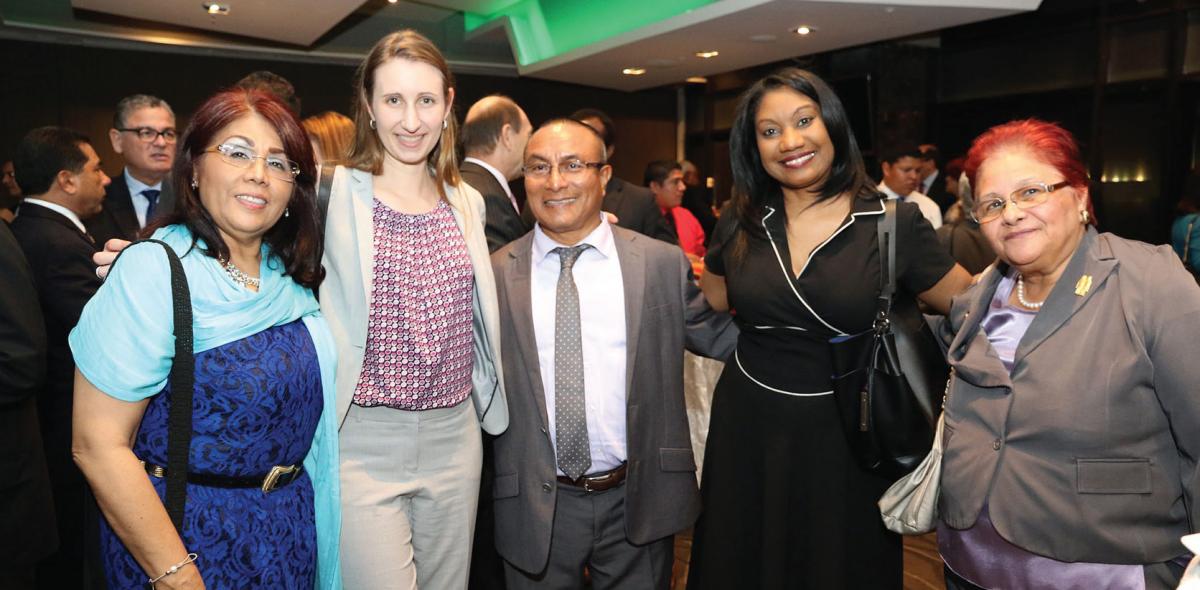
Kristin Stewart, second from left, engages with Panamanian leaders during the political counselor’s welcome reception in October. From left, activist Irasema de Ahumada; Ileana Molo, former IVLP grantee and president of Afro-Panameña Soy; Paliwitur Sapibe, director of indigenous affairs; and Gladys de Fossati, director of the Panamanian Institute of Labor Studies.
Courtesy of Public Affairs / U.S. Embassy in Panama
To address these and other issues, FWP Coordinator Tran began a series of informal monthly meetings in Panama that rotate between the offices of the senior female section heads. This allows newer employees, particularly EFMs, to learn about the functions of a variety of sections and agencies at post. It also helps integrate the interagency team and keeps everyone informed of management issues, career opportunities and other trends. Recently, the group held an informational brown-bag lunch with the visiting EEO trainer from State’s Office of Civil Rights. We also organized a women’s career panel at a local high school in honor of the International Day of the Girl Child in October 2015.
Yes, when needed, we share tips on the best electric breast pump for return to work. But, more importantly, we share advice and strategies for everything from completing office tasks and navigating the Foreign Affairs Manual to bidding for onward assignments.
Mentoring
One potential best-practice that stemmed from rejuvenation of the FWP in Panama is the establishment of a mentoring program at post. Ms. Tran and Ms. Stewart, for example, have formed a formal mentee-mentor relationship. In addition, they help pair other mentees and mentors who request support at post. While men are encouraged to serve as career mentors, our group has found that there is a unique synergy created when senior women share their experiences with those just starting out.
There are, of course, other formal mentoring programs available for FSOs, but they generally entail a long-distance relationship and are designed to match like-coned FSOs. By contrast, we have found it very beneficial for mentees to be able to reach out to a more senior officer at post for real-time advice and guidance, without having to explain the context of the country, culture or post.
In the overseas context, it is also important to take advantage of the interagency team and learn from female role models in the military, the Department of Homeland Security and other federal government agencies. These women have much to share in terms of balancing family and work, career advancement, time management strategies and more.
We share advice and strategies for everything from completing office tasks to navigating the FAM to bidding for onward assignments.
According to the 2014 Foreign Service promotion statistics—the latest statistics available with a breakdown by gender—only three women were promoted from FE-MC to FE-CM, 21 from FE-OC to FE-MC and 37 from FS-1 to FE-OC. Given the dearth of female leadership at the highest levels of the Foreign Service, it is essential that we do all we can to recruit and retain female officers and specialists at the entry- and mid-levels to ensure there is a critical mass of women who are eligible to compete for promotions in the Senior Foreign Service.
A Good Starting Point
Based on our experience in successfully rejuvenating the FWP in Mission Panama—a medium-sized post with a relatively small Department of State presence—we would like to encourage other posts to take advantage of this valuable resource for active engagement with and direct advocacy for female officers, specialists and EFMs with the front office and the department. When coupled with other initiatives, the FWP can serve as a good starting point. Other posts will, of course, face different challenges and opportunities, but we hope these simple tips will help other posts seeking to replicate our effort:
• Assign an entry-level officer to serve as the FWP coordinator, but appoint more senior officers to serve as advisers to the FWP coordinator. This arrangement enables the entry-level officer to acquire managerial and leadership experience that she can use in her future assignments while the more senior officers, with more knowledge of departmental and Foreign Service regulations, can provide appropriate guidance and mentor the entry-level officer throughout their tenure as members of the FWP.
• Organize regular meetings with female officers, specialists and EFMs at post. Since our first meeting as a group in the fall, the Panama FWP has held monthly meetings focused on concerns highlighted by our members during the initial gathering. Senior female officers take turns hosting and facilitating the sessions. By regularizing our schedule, the group has slowly attracted the attendance of more women at post, and the increased membership has enabled us to expand our goals and initiatives.
• Document meetings and ensure follow-up prior to the next meeting. One way to ensure we hold ourselves accountable as a group is by taking notes and assigning ourselves tasks at the end of each meeting. Before each upcoming meeting, we remind ourselves of items still pending on the agenda.
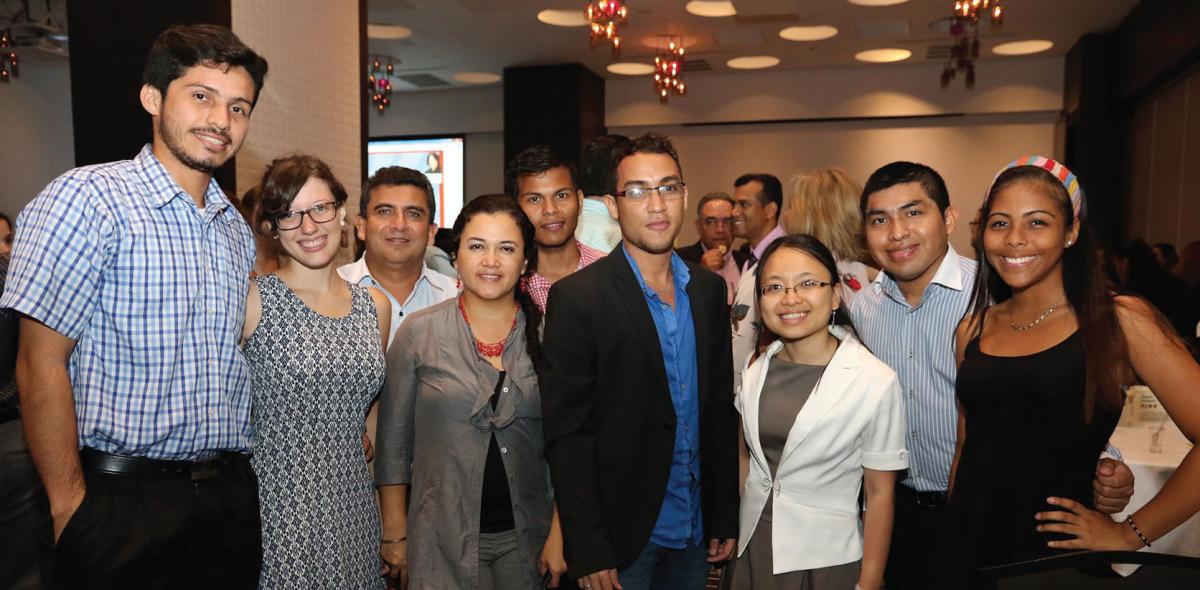
In September, Thao Anh Tran, third from right, joined young Panamanian leaders from varied backgrounds who are members of the embassy’s Youth Advisory Council to celebrate U.S. Hispanic Heritage Month.
Courtesy of Public Affairs / U.S. Embassy in Panama
• Create and maintain an updated listserv to facilitate communication and to disseminate information and opportunities that benefit group members. The FWP has brought together women from diverse backgrounds, offices and agencies within Mission Panama who otherwise would not have the opportunity to interact and exchange their knowledge and expertise with one another. Our listserv has given us an effective means to share and distribute information such as employment opportunities and has helped create a cohesive network of women within the mission.
• Look for opportunities to facilitate meetings between FWP and State Department visitors. Whether it is the attorney adviser from the Office of Civil Rights or an office director, the FWP takes advantage of every opportunity to ensure our visitors get a chance to hear directly from our officers, specialists and EFMs regarding their concerns. Through these interactions, group members are able to obtain accurate information first-hand while our Washington visitors can take note of issues at post.
• Solicit support for the FWP from the front office. In Panama, we have been fortunate in this regard because the more senior members of the FWP have been active in bringing our collective concerns to the attention of the front office, whose occupant has been responsive to the group’s needs. For example, following our request for establishment of a mentoring program, our chargé immediately expressed his support and asked how the front office could be of assistance. Currently, formal training is available only for EEO counselors at post. This is helpful, but is limited to resolving problem situations for female employees and does nothing to mentor, equip and empower the next generation of females for leadership.
It’s Up to You
Ultimately, the FWP is what you make of it at the post level. Until Foreign Service demographics more closely match the gender makeup of the U.S. population, there will continue to be a distinct need for initiatives such as the Federal Women’s Program. By creating a local embassy-level forum for women to communicate their needs and goals, we can more effectively communicate and plan with the front office to support them.
Our hope is that more posts will adopt similar models of a robust FWP working group, the front offices at other embassies will encourage and support the FWP and the State Department will consider hosting either regional or global conferences for FWP coordinators to share best practices.
Read More...
- Diversity in Diplomacy: The Mentoring Dimension by Jennifer Zimdahl Galt and Thao Anh Tran (The Foreign Service Journal, June 2015)
- The Federal Women’s Program


